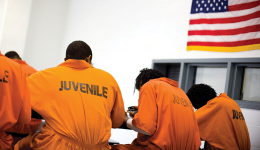Denton Juvenile Defense Attorney
Protect Your Child’s Future
Texas has a unique set of laws to handle children and young adults that are accused of committing various criminal offenses. Until a child turns 10 years old, Texas does not hold them criminally responsible for their actions. Once a person turns 17 years old, the State treats all actions as adult matters. But between the ages of 10 and 16, your child can be accused of committing a crime and be brought into the juvenile justice system.
The juvenile justice system requires representation for your child. Unlike adults, who can represent themselves, the Juvenile Justice Code requires that a child be represented by an attorney. Finding the right attorney is important. The juvenile justice system consists of civil cases alleging criminal matters and blends the Texas Penal Code, Texas Family Code and the Code of Criminal Procedure all together. If you want your child’s rights to be protected, you need to find an attorney that is knowledgeable regarding this unique system.
“My Child Has Been Arrested!”

Most parents come in contact with the juvenile justice system by receiving a phone call that their child has been arrested. If this has happened to you, there are some things that you should know. First, your child is in Juvenile Detention not in jail with adult offenders. State law requires that juveniles be housed separately from adults in a specific juvenile detention facility. Second, you cannot bond your child out of detention. Detained juveniles are not entitled to bonds like adults are. Instead, the juvenile court will hold a detention hearing on the first business day after a child is detained. At that hearing, the Court will decide if the child gets to go home or remains detained for two weeks.
It is not necessary to have an attorney for your child at the initial detention hearing but it can certainly help. A skilled and knowledgeable attorney can assist in providing the court with information that may make the difference in whether your child is released or held for the next two weeks. If your child is detained by the judge at the initial detention hearing you must hire an attorney for your child prior to the next detention hearing.
What Penalties Your Child Can Face
Detention is not the only result that your child can face after being accused of committing a criminal act. The local District Attorney’s Office can also choose to file a formal case against your child depending on the circumstances. These cases are broken out into allegations of delinquent conduct or child in need of supervision.
Delinquent conduct is what the juvenile justice system calls crimes. These are the same crimes that an adult could be charged with. A child in need of supervision is a violation that only a child can commit, such as being a runaway. Regardless of the type of charges brought, your child faces the possibility of the allegations being found true and then the court assessing the punishment that it believes is warranted.
Punishment In The Juvenile Justice System
The Texas Juvenile Justice Code views child offenses differently than the adult system does. The juvenile system is supposed to be one focused on the rehabilitation of youth. In fact, the Juvenile Justice Code provides progressive sanction guidelines to help determine what sanctions the court should impose if it determines that a child has done wrong. These sanctions include informal probation that can result in a dismissal of charges against your child; formal probation in your home; probation with placement at a treatment facility or correctional facility; or placement at the Texas Juvenile Justice Department’s prison for children. Moreover, the sanctions must end by either your child’s eighteenth birthday if on probation or nineteenth birthday if placed at the Texas Juvenile Justice Department.
While the Juvenile Justice Code provides guidelines that promote rehabilitation, the ultimate decision on what your child will face is up to the court. You will want an attorney who knows the juvenile justice system and is familiar with the practices and policies of the specific juvenile court. Knowing what type of evidence or information the judge will want to hear can make a difference on what sanctions the Court imposes on your child.
Treating Children Like Adults
In some circumstances, you may find your child faced with the District Attorney’s Office wanting more adult-like punishment than is normally contemplated by the juvenile justice system. The State has two ways they can seek to enhance the sanctions your child faces — determinate sentencing and discretionary transfer.
Determinate sentencing opens your child up to adult-like sentences of up to 40 years in adult prison, depending on the alleged criminal offense. Your child would first face juvenile sanctions, then upon turning 19, at the discretion of the court, could face an adult sentence as well. In order for the State to seek determinate sentencing, the case must meet a specific set of criteria and they must present the case to a grand jury and obtain their approval.
Discretionary transfer is the legal term for certifying a child to stand trial as an adult. Like determinate sentencing, the case must meet a specific set of criteria in order to be eligible for transfer to an adult court. The state must also obtain approval for transfer by the juvenile court in a contested hearing. If the case is transferred, the case and your child are now part of the adult system and face all of the punishments that an adult might face.
Both determinate sentencing and discretionary transfer cases represent the most severe consequences a child can face. Without knowledgeable, aggressive representation, your child may be looking at probation into their college or working years or possible prison time. In these cases, it is even more important that you look for an attorney who knows the juvenile justice system.
Get Help From A Former Juvenile Prosecutor
Attorney John Rentz worked for a number of years as a juvenile prosecutor in Denton County’s only juvenile court. This gives him the knowledge and understanding of the policies and practices of the court and the prosecutors that are handling your child’s case. Not only can he assist in obtaining the best possible outcome for your child’s case, but he can also assist in sealing your child’s juvenile record when the time comes. This will allow your child to go to college or enter the workforce without worrying that someone may learn about his or her youthful transgressions. Call Law Offices of John C. Rentz, P.C. at 940-488-1026 or contact us online to schedule an initial consultation.

